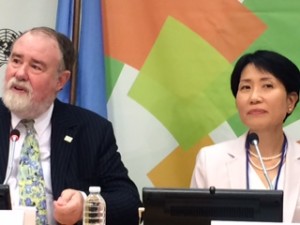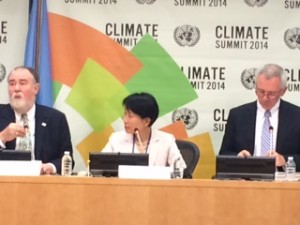The Global Environment Facility (GEF) will support developing countries with over $3 billion for financing actions to mitigate and adapt to climate change over the next four years.
The newly completed Sixth Replenishment of the GEF Trust Fund, together with expected funding from its climate adaptation funds, will enable the GEF to make $3 billion available for climate finance in the next four years, with an expected $30 billion being leveraged from other sources.
 “We urgently need strong action on climate change,” said Dr Naoko Ishii, CEO of GEF. “The GEF is proactively seeking to produce the maximum impact from our investments, working together with other stakeholders to achieve the change that the world needs”.
“We urgently need strong action on climate change,” said Dr Naoko Ishii, CEO of GEF. “The GEF is proactively seeking to produce the maximum impact from our investments, working together with other stakeholders to achieve the change that the world needs”.
The GEF supports climate change initiatives in countries across a broad spectrum of action areas. A total of $910 million has been allocated to individual countries to support national climate change mitigation policies and strategies, enhance renewable energy supply, increase energy efficiency, including sustainable transport and urban design, expand climate smart agriculture, and work to reduce short-lived climate forcers. The GEF has also allocated $225 million to support UNFCCC-related reporting and assessments, including Intended Nationally Determined Contributions, and to help integrate their findings into national policy planning and implementation.
In addition, as leading global financier of climate change adaptation, the GEF expects to program up to $1.2 billion towards enhanced resilience, adaptation and disaster risk reduction. The GEF has already transferred $314 million to 53 countries to strengthen the hydro-meteorological and climate information services, allowing governments, private enterprises, civil society and individuals to integrate climate change risks and adaptation into their decision-making processes. The GEF and its partners are also preparing regional programs that will deploy ecosystem-based adaptation measures to enhance resilience in cities in at least nine countries across Latin America and the Caribbean, and the Asia-Pacific region.
In an effort to pilot innovative approaches, in the next four years the GEF will provide dedicated financing for three high-impact integrated programs. Through the Sustainable Cities program $100 million will be dedicated to help mayors and other municipal leaders make cities more sustainable, cleaner, more efficient, resilient, and prosperous, generating global environmental benefits through local action.
“There is no better entry point to address the world’s major drivers of environmental degradation than cities and urbanisation”, said Ishii. “With this programme we aim to create a global platform that can support Mayors and city managers to develop and execute integrated plans that help lower cities’ environmental foot print and increase their resilience. Importantly, the programme will also facilitate learning and sharing of effective solutions among cities around the world.”
 Ishii also noted two other new GEF programmes, including $110 million to improve food security, strengthen resilience and enhance carbon sequestration in sub-Saharan Africa, and $45 million to eliminate deforestation from commodity supply chains by harnessing the growing public and private sector interest in adopting more sustainable practices to produce commodities such as palm oil, soy and beef.
Ishii also noted two other new GEF programmes, including $110 million to improve food security, strengthen resilience and enhance carbon sequestration in sub-Saharan Africa, and $45 million to eliminate deforestation from commodity supply chains by harnessing the growing public and private sector interest in adopting more sustainable practices to produce commodities such as palm oil, soy and beef.
The GEF helps to transform policy, strengthen institutional capacity, build multi-stakeholder alliances, and de-risks partner investments, as well as explore synergies across its many lines of climate-related financing. The GEF plays a key role in demonstrating innovative approaches and instruments that can be scaled up by other players, including the Green Climate Fund as it becomes operational, moving towards a constructive negotiations outcome in 2015.
